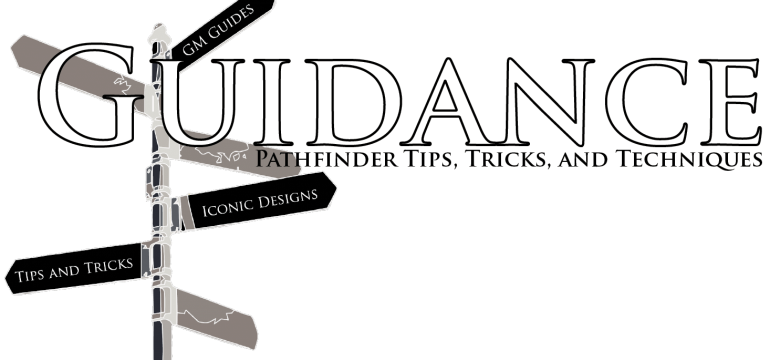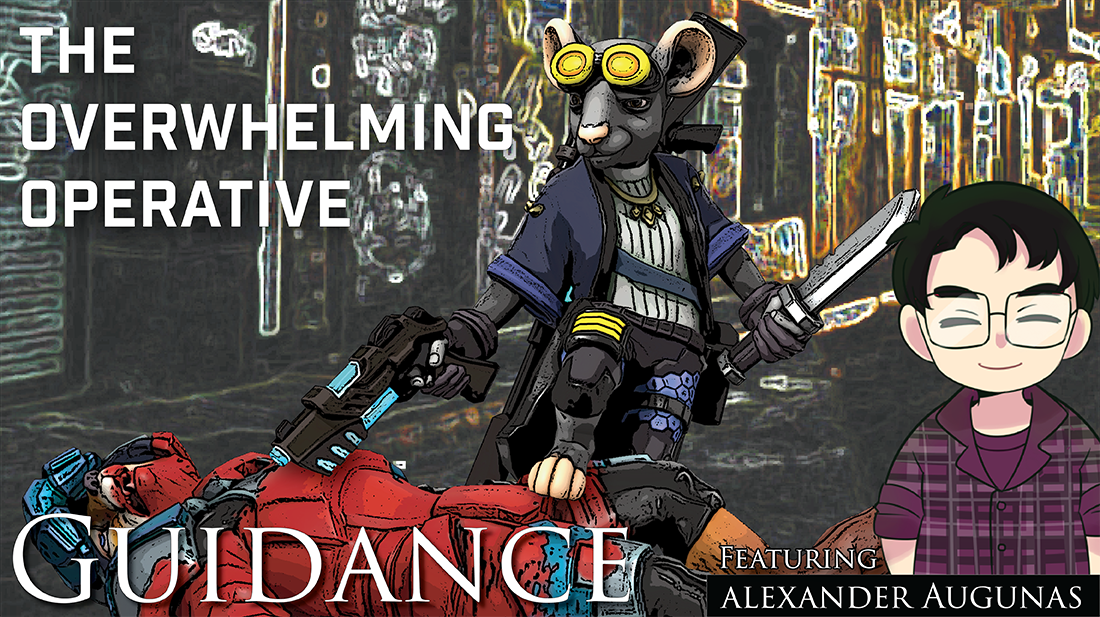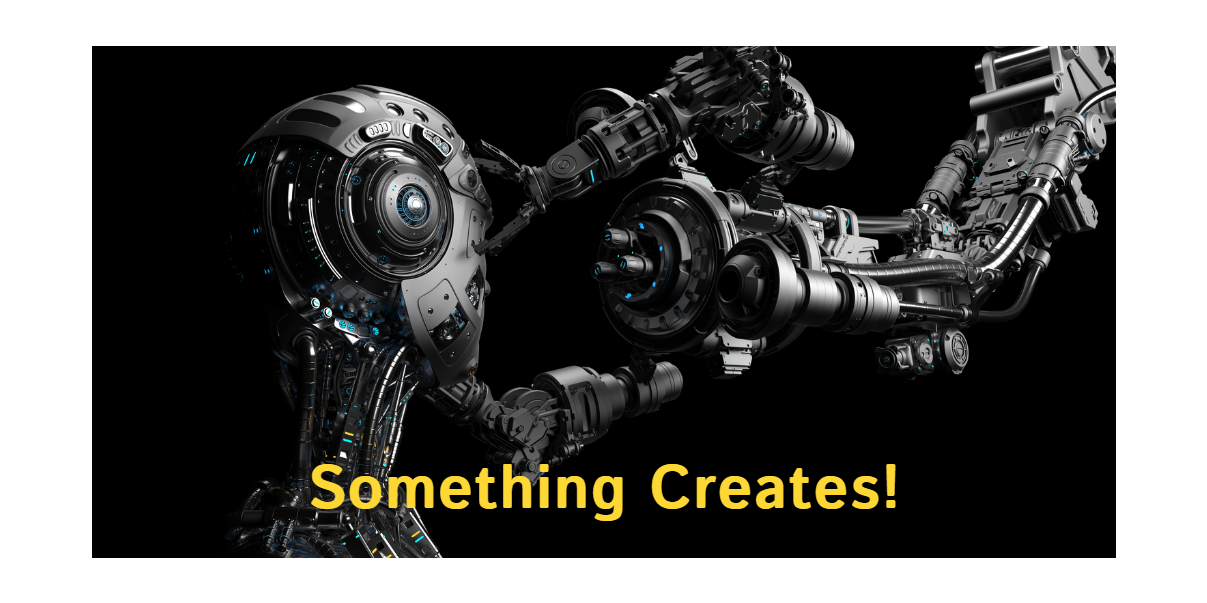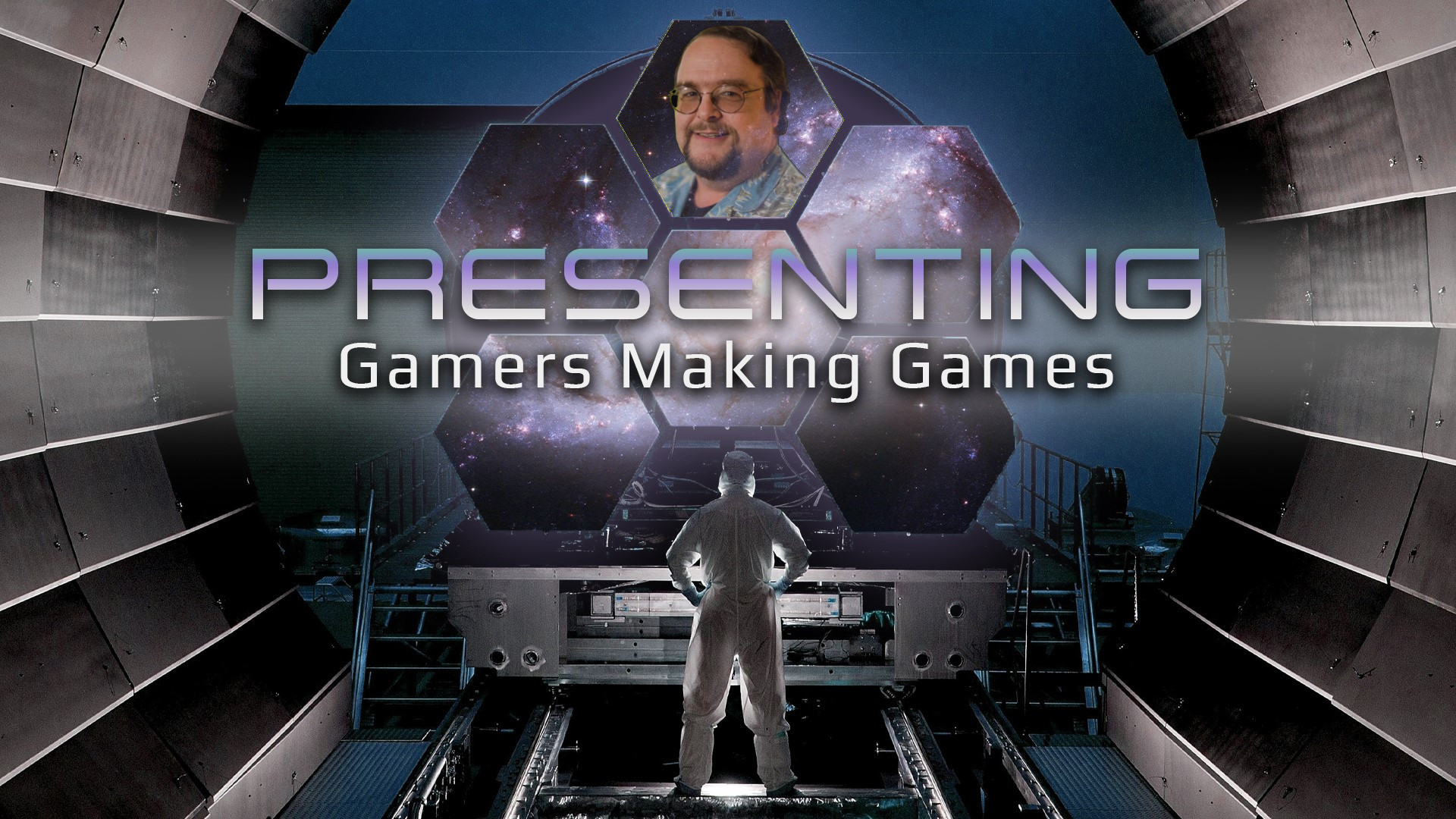Hello, and welcome to Guidance! I promised in my last article that today was going to be a bit of a more up-beat article, since my last two were poking pretty big holes in things I don’t like in the Strfinder RPG. At a glance, today is going to look like I’m a liar, because I’m going to point out another thing Starfinder does design-wise that isn’t great and needs improvement. Unlike my last two articles, however, which generally identify problems that are too big to fix in the span of a single article, this blog post is going to have a solution that’s so good, I’ve mentioned it in print products a few times. And I’m going to give it away to all of you for FREE. (Of course, if you want to pay me anyway, you can always buy an Everybody Games product and note for yourself that you did so because of this helpful tip.)
Anyway, on to the article!
The “Operative” Problem
Starfinder has a ton of great pre-written adventures, but designing them can be challenging because of what I like to call, “the operative problem.” You see, Starfinder and Pathfinder 2E have this design quirk wherein both games identify a character building niche and then assign that niche to a specific class. The assigned class is henceforth decreed to be the, “Best” in that niche, and every other class that gains access to said niche isn’t allowed to come close to the golden niche-holder. This is a problem that people in the Know Direction Network discord channel talk about all the time; the most common complaint is attributed to Pathfinder 2E’s cleric class, which is given supreme domain over in-combat healing to the extent that no other character, even the life mystery oracle, comes close. It’s pretty hard to compete with over 3 bonus, max-level spell slots per day usable only for healing.
Starfinder has similar problems with niches, but not so much with healing. That’s because any character can spend a Resolve Point to heal half their total Hit Points. Having a mystic (the only spellcaster who is apparently allowed to have Hit Point healing spells by default) is nice, but it’s hardly mandatory for the healing. While I can go on about the niches of the spellcasters of Starfinder and how they ultimately detract from the flavor they try to create all day, they’re not the trope namer for the most glaring example of over niche-ification in Starfinder. That honor goes to the operative class, a class that virtually everyone I talk to has identified as being overpowered, but no one really understands why. It’s definitely not for the damage; trick attack is not the power house of rogue in Starfinder. The operative’s trick attack is more about debuffs than damage. No, the operative’s real niche problem lies in the fact that, mathematically, it is so good at every skill in the game that it completely destroys the mathematical progression for skills. Don’t believe me? Well, let’s look it over.
Skill DCs in Starfinder
When we look up Skill DCs in the Starfinder CRB, this is what the book has to say:
It is up to you, as the GM, to determine the DCs of the various skill checks the players will attempt during play. Many of the skill descriptions include guidance on typical DCs for skill checks, but there may be times when you need to come up with a DC on your own. If a skill check does not have a predetermined DC, or if a player wants to attempt a task that is not covered in a skill’s description, use the following guidelines. A challenging DC for a skill check is equal to 15 + 1-1/2 × the CR of the encounter or the PCs’ Average Party Level (APL). For an easier check, you might reduce the DC by 5, while increasing the DC by 5 makes for a more difficult check. Changing the DC by 10 or more makes for either a trivial check with little chance of failure or a prohibitively high check with little chance of success, so be cautious when adjusting skill check DCs!
Okay, so a challenging DC is 15 + 1-1/2 times the CR of the encounter or the PC’s APL. Rather than explain with words, let me go back to my roots and explain … with … MATH!
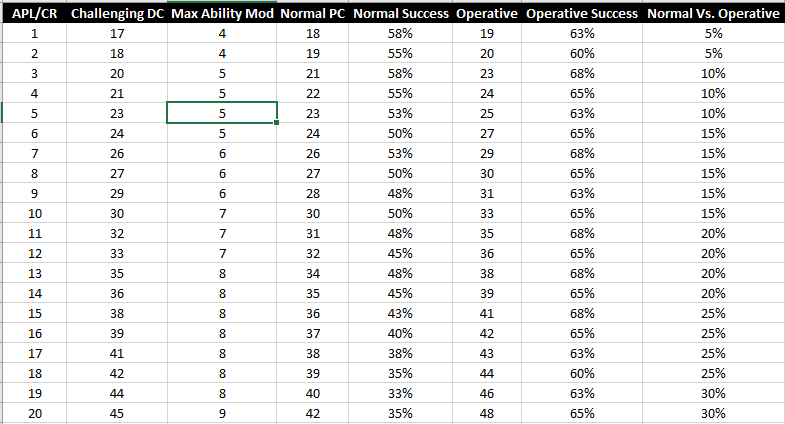
Here’s a delightful little table, and some notes about what everything is.
- APL/CR is the Average Party Level or the CR of whatever is setting the DC.
- Challenging DC is the DC For that APL or CR, based on the formula in the Core Rulebook.
- Max Ability Mod is the highest possible ability score modifier you could have at that level. It assumes you bought an 18 at 1st level, put an ability boost into that score at every possible level, and have the best possible personal upgrade for that level.
- Normal PC is the total skill bonus a PC that does not get an insight bonus to skill checks would have at that level if they had the maximum possible ability score modifier. It does not include the floater +1 bonus you can get for having a theme with a skill bonus.
- Normal Success is the chance that you succeed at the skill check. The math’s a little janky; you should round down to the nearest 5 for all of these (so at APL / CR 1, the success change is 55%, not 58%). You round down because each side of the die on a d20 is an even 5% chance, so while these calculations take in the .5 average on a d20, in my opinion that’s not practical.
- Operative is the total bonus an operative (or another PC who has a scaling +1 insight bonus) has at that level. Note that non-operatives with a similar bonus, such as mechanics or biohackers, usually have this bonus on a delay of 1-2 levels, while envoy is a whole different can of worms because their insight bonus is a random value.
- Operative Success is the chance that someone with an operative bonus progression succeeds at the challenging skill check. This number should be treated as I described in Normal Successes.
- Normal Vs. Operative is the difference between the operative’s bonus and the normal bonus.
So, looking at the numbers the thing that becomes immediately apparent is that the operative absolutely destroys in skill checks. By a lot. These numbers will probably reflect Dex-based skill checks, such as Acrobatics or Stealth, more than any other, but it’s a good note about just how impactful that scaling insight bonus is in a game that otherwise doesn’t really have skill bonuses. The difference between someone who has an operative insight bonus and those who don’t is stark, and ultimately one of the biggest problems is that Starfinder characters don’t really have a way to mitigate that. You basically have a scaling insight bonus ability, or you don’t. Skill Focus can help mitigate this at lower levels, but at higher levels the bonus is just sort of forgotten, and the Skill Synergy bonus isn’t great, only giving a +2 insight bonus to two skills.
Now, I want you to look at these numbers and imagine what they would look like with an average ability score. Or don’t, and let me show you.
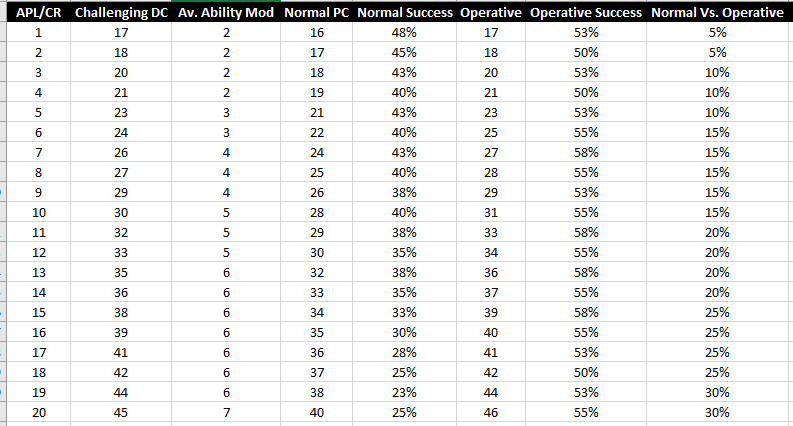
So for this table, I replaced “Max Ability Mod” with “Average Ability Mod,” which assumes you started with a 14 in the ability score, boosted it at every level, and started applying a lower-rank personal upgrade to it at 7th level, after upgrading your old Rank 1 to a Rank 2. And if you compare the numbers, you start to see the issue. At Level 20, a normal PC has a 25% chance to succeed, but the operative still has a 55% chance. That’s insane! Comparisons like these are, where you compare something you’re mediocre at, are more important than comparing the highest echelons of play because this is the point where one player is mostly failing and one is mostly succeeding, rather than both succeeding but one with a little more ease. This is FRUSTRATING, and this is also going to be the case for a ton of skills.
One more thing, if you take the “Average Operative” results and compare them to the “Maximum Normal PC” results, the operative either has the same bonus, or better. That’s right, the operative’s bonuses are THE SAME OR BETTER in skills they have a mediocre ability in compared to a member of another class who “specializes” in that skill. Add the fact that operatives of 10 skill ranks per level before Intelligence in a game with 20 skills (19 if you ignore Profession), and you can start to see why people are just frustrated with the operative’s overwhelming mastery.
So, how do we fix it?
An Elegant Solution
Changing Starfinder’s math would be a pain, but what if we adjust where the math is coming from while also securing the operative’s role as, “The skills class?” There’s an easy, two-step approach to doing that; allow me to show you.
Skill Focus
You are particularly adept at a certain skill.
Benefit: Choose a skill. You gain a +3 insight bonus to checks involving the chosen skill. The bonus improves to +4 if you have 11 or more ranks in the chosen skill, +5 if you have 15 or more ranks in the chosen skill, and +6 if you have 19 or more ranks in the chosen skill.
Special: You can take this feat multiple times. Each time you take this feat, it applies to a new skill.
Skill Synergy
You understand how two skills work well together.
Benefit: Choose two skills that you do not already have a theme bonus to skill checks with. These skills become class skills for you. If one or both were already class skills, you gain a +1 theme bonus to those skill checks instead.
Special: You can take this feat multiple times. Each time you take this feat, it applies to a new skill.
Step 1 is to completely change Skill Focus and Skill Synergy so insight bonuses and theme bonuses (yes, we’ll be renaming that untyped bonus that most theme knowledge perks give to “theme bonus”; it’s easier that way) are no longer exclusive to specific classes and themes. While some might mourn the loss of exclusivity, I think that this opens up character building and makes encounter design easier. It’s a worthy trade-off.
Step 2 is to change EVERY class feature in the game that grants an insight bonus to skill checks to instead grant Skill Focus with those skills, with the sole exception of the envoy’s expertise die. This means EVERYTHING else though; bypass, scientific method, all of it. The ONLY one we’ll be changing is operative’s edge, because operative’s edge currently applies to every skill. Instead, we’ll make this tweak:
Operative’s Edge
Your diverse training as an operative grants you a +1 insight bonus to initiative checks. You also gain Skill Focus as a bonus feat three times—once with each of your specialization’s associated skills and once with any skill of your choice. At 3rd level and every 4 levels thereafter, this insight bonus increases by 1 and you gain Skill Focus as a bonus feat.
This will dramatically cut an operative’s skill coverage while also normalizing the bonus they gain. As a final tweak, we’re going to improve Jack of All Trades, an operative exploit that doesn’t work with the new system.
Jack of All Trades (Ex)
You’ve learned how to handle any situation. You can use all skills untrained and add half your operative edge class feature’s bonus to skill checks you attempt with skills in which you have at least 1 rank, or twice your operative’s edge class feature’s bonus to skill checks you attempt when using a skill in which you have no ranks.
This cleans up Jack of All Trades to work with the new rules set while also increasing its value, since it applies to basically every skill you don’t have Skill Focus with now without creating the same overwhelming “I’m better than you” effect.
Thanks for reading my article! What do you think? How do you handle skill DCs in Starfinder? Does your group like playing with operatives? Is this overboard? Let me know in the comments, or hop into the Know Direction Network’s Discord Channel and let me know in person in our #Starfinder channel!
I’m Alex Augunas, the Everyman Gamer, and I’m signing out! Peace!
